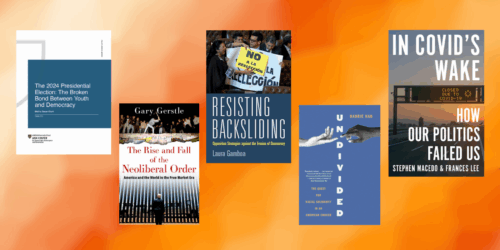As the dust settled from the 2022 midterm elections, most eyes were on which party would win control of Congress and statehouses around the country. However, an even bigger issue was at stake during last month’s vote according to a panel of election experts convened by the Ash Center to discuss voting reforms and the resiliency of the country’s election administration system.
“71% of the nation thinks that democracy is at risk,” said Wendy Underhill from the National Conference of State Legislators. Voting rights advocates had braced themselves for a wave of voter intimidation and efforts to challenge the legitimacy of the vote. “The election went surprisingly well from an election administration point of view,” Underhill added. “There were fewer glitches than usual, there were fewer court cases than usual, and virtually no candidates didn’t concede at the end of the day.”
In addition to the smooth sailing seen in most polling locations across the country last month, many voters were presented with a number of election reform measures on the ballot. Connecticut voters, for example, helped paved the way for early in-person voting in future elections. Michigan voters also approved a new constitutional amendment which guarantees a nine-day early voting period and allows the use of ballot drop boxes.
Voters in a growing number of cities around the country adopted rank choice voting in municipal elections. This growing election reform measure allows voters to rank their preferred candidates, which proponents argue reduces negative campaigning and rewards candidates who build a broad base of support. “Millions of voters got to use ranked choice voting, and this includes some cities that already have it in place and some that were using it for the first time,” said Otis. Election reform supporters, including Otis’s own FairVote are pushing to implement ranked choice voting in presidential primaries, where the dynamic nature of campaigns means that some voters end up casting their ballots for candidates who ultimately drop out before primary contests are formally held.
In perhaps one of the most far-reaching reform proposals enacted last month, voters in Portland Oregon, approved a slate of municipal reforms, which included the creation of the country’s first proportional ranked choice voting system. Explaining how the progressive bastion of Portland is still grappling with its history of racial discrimination, Jenny Lee, the deputy director of Coalition of Communities of Color, an Oregon-based alliance of culturally-specific-community-based organizations told audience members that “[Oregon] was founded on a history of exclusion under our constitution. Actually, Black folks could not come into the state when it was founded.”
That legacy extended to a city commission form of local government that saw an elected mayor and four commissioners serve simultaneously as both city councilors and heads of city departments. That convoluted governance structure was widely credited as being both unrepresentative and increasingly unable to respond to the city’s growing crime and other social problems. “We had a system that was intended to dilute the electoral power of minority communities,” said Lee.
Over the past century, only five councilmembers of color have been elected in Portland Lee explained, with only two councilmembers representing the city’s far eastern neighborhoods, considered among the most under resourced in the city. “We believed that a cohesive group of voters, a community of interests, should win seats in a representative body and a fir proportion to the votes that they win. And that does not happen in winner-take-all elections.”
Instead, Lee and other advocates proposed a unique system of proportional ranked choice voting that would divide Portland into 4 geographic districts all with equal population. Voters would then choose three council members from each of the city’s four new districts using a ranked choice voting system that requires only 25% of the vote to win. Voters would still rank candidates in order of preference similar to traditional ranked choice voting elections, but Portland’s newly proposed system would redistribute those votes in a way that help ensure that more women and candidates of colors are likely to be elected to the city council.
“We had a huge opportunity in this election to achieve the reforms that we’d been considering for a long time, said Lee. “A multi-generational effort, with strong advocacy from both youth and older folks, really brought folks together. This was multiracial and really represented the future of Portland.”





